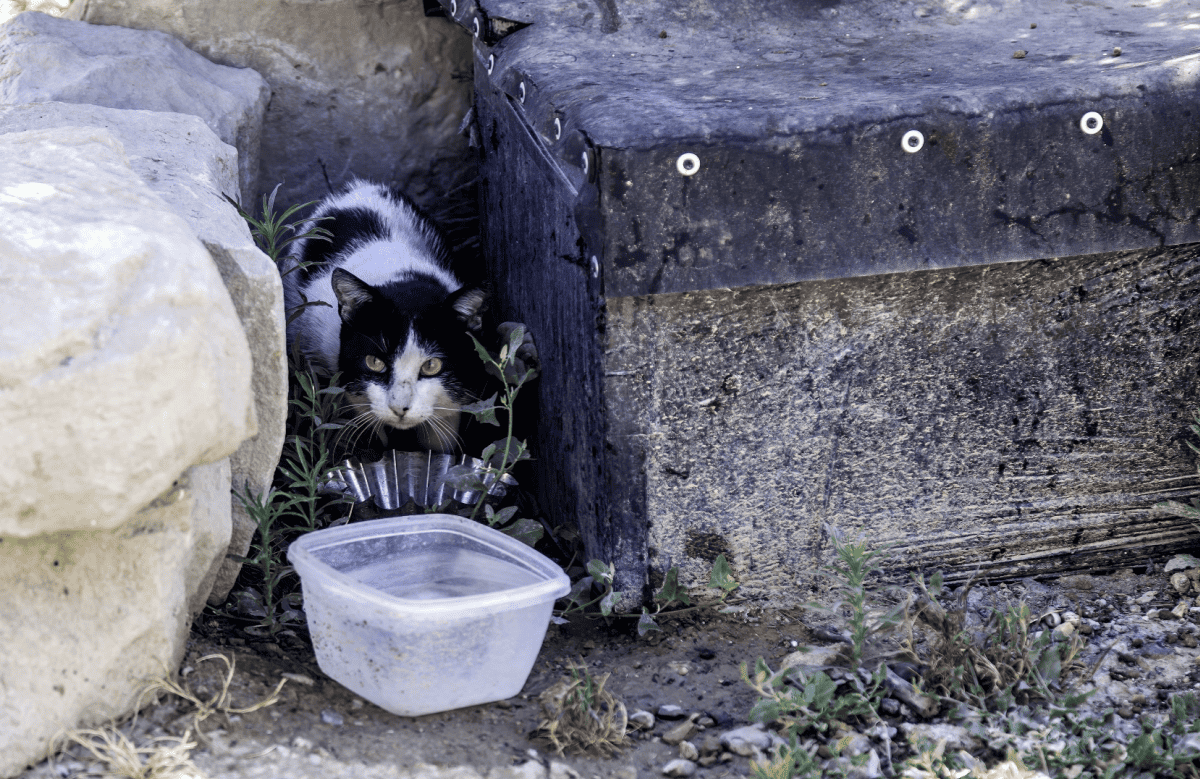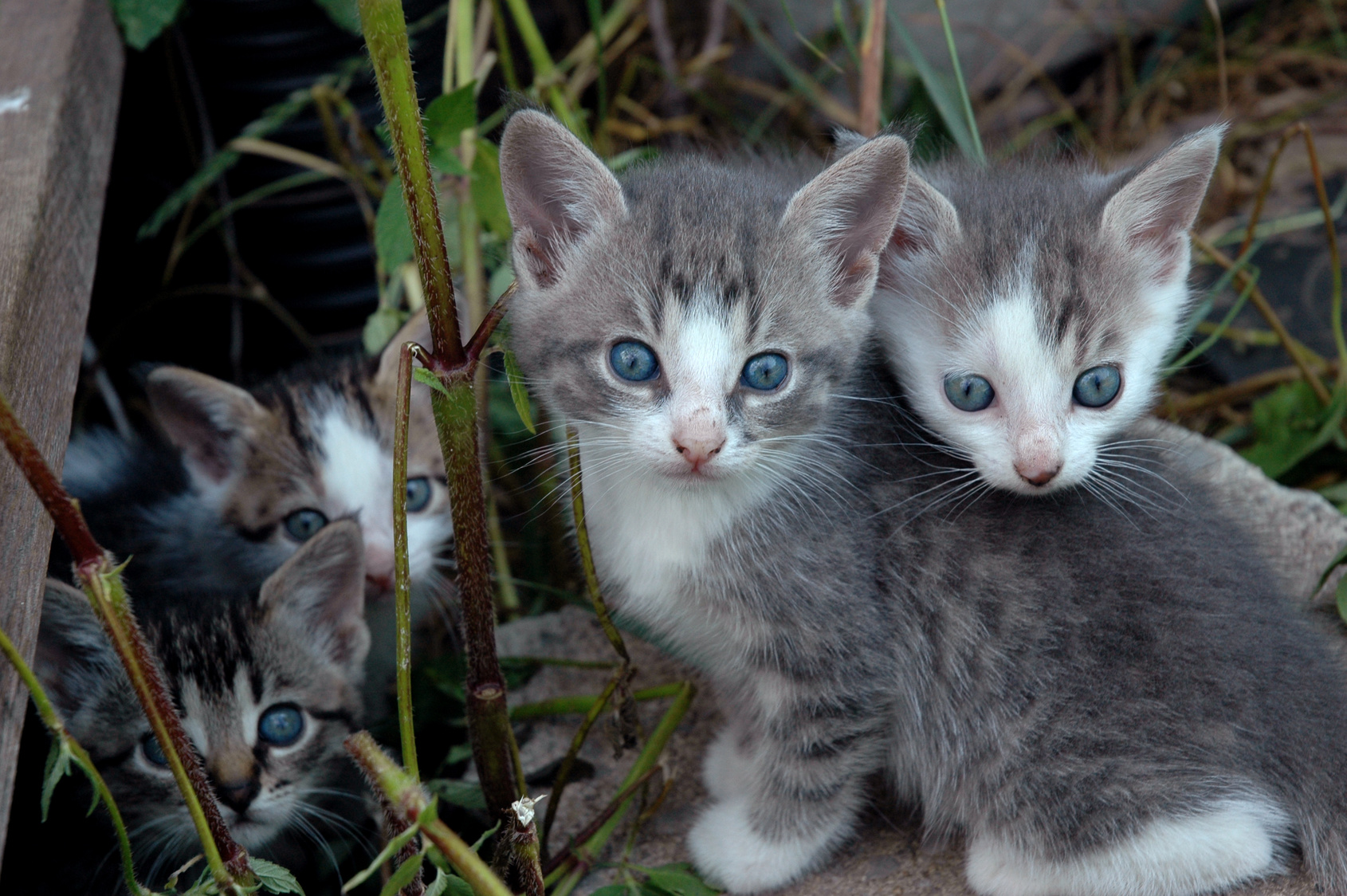Strolling down the street, you spot a cat. It's cute, a little shabby, and seems to be on its own.
You wonder - is it a stray, or could it be feral? It's a question that may leave you puzzled.
Sure, both are cats. Both survive in the wild. But here's the deal - they are not the same.
In this article, we'll delve into the captivating world of these independent felines. We'll give you the scoop on the key differences between stray and feral cats.
Get ready to sharpen your feline-spotting skills and embark on a journey that'll open your eyes to a world that often stays hidden in plain sight.
Can you tell a feral cat from a stray?
By the end, you'll answer that question with confidence. Stick around. The answer might surprise you.
The Mystery Visitor: Stray Or Feral?
There's an unfamiliar cat visiting your backyard. Maybe this kitty hides away under your porch, only coming out to eat the cat food you're leaving out?
Or maybe he or she meows at you from afar or even approaches you? What should you do?
Figuring out if this is a feral or a stray could make a huge difference in how you can help that cat.
First, some definitions. What do the terms "stray" and "feral" even mean in cats?
After all, biologically speaking, feral cats and strays are the exact same species. They're domestic cats, identical to our own pampered pet cats.
However, behaviorally, there is quite a difference between them and it affects the way in which you can help make their lives better.
What Is A Feral Cat? Traits and Taming Possibilities
A Feral is a domestic cat that had little or no socialization with humans during the first months of its life.
Kittens form their view of the world between the ages of 2 and 16 weeks. That is when they learn to distinguish between friend and foe.
Plenty of positive interaction with humans teaches them to trust people and see us as a source of food, protection, and comfort.
In contrast, kittens that were born outside of a home and had no close loving interaction with humans learn to see humans as a potential threat.
While biologically they are still domesticated cats, they have gone feral and reverted to wild behavioral patterns.
You can expect a feral cat to behave much like a wild animal when cornered or trapped.
Is It Possible To Tame A Feral Cat?
The short answer is: Yes. There are ways to work with a feral cat to make him or her less apprehensive of people.
The process is slow and requires a good knowledge of feline behavior and - preferably - some experience.
The younger the cat, the better the chances for him or her to become fully accustomed to humans, to the point of becoming a suitable pet.
However, most experts agree that adult feral cats are best left feral, as the process of socializing them is time-consuming and can be stressful for the cat.
These kitties can live long happy lives when provided with food and shelter so this is considered the best option for them.
The Key To Feral Cat Care: The TNR Method
The most important thing you can do for feral cats is spay or neuter them.
That will keep the cats healthier and prevent the birth of more feral kittens.
The method used to neuter feral cats is known as TNR. That's an acronym for Trap-Neuter-Return which basically describes the process.
The cats are humanely trapped, neutered in a veterinary clinic, then returned to the place where they were captured or to a better location where they can be cared for.
You can read more about TNR and feral cat care here:
- Everything You Need To Know About Tnr (Trap Neuter Release)
- 9 Practical Ways For You To Help Feral Cats
- Feral Cats - The Invisible Felines
- Handling Feral Cats
- 10 Facts You Should Know About Feral Cats
What Is A Stray Cat? Lost Pets In Need Of A Home
A stray cat is simply a pet cat that no longer has a home. That cat grew up in a home and had the proper socialization with humans but then he or she either got lost or was abandoned by the previous owners.
A stray cat needs a home. It may be able to survive on the streets but it would be immensely better off in a loving home.
For a cat that's lost, the best outcome is to be reunited with his or her family.
Unfortunately, some stray cats were deliberately and illegally abandoned, so they don't have a loving home to return to. In that case, they need to be re-homed.
Left on the streets, a stray cat is not only at risk of car accidents and predators but also of abuse by humans.
If you find a stray cat, the best thing you can do is take her or him into your home (kept separately from your own cats).
It may be lost, so try to locate the original owner. If that doesn't work, look for a good forever home, or adopt the cat yourself. If you can't do that, the local pet shelter is the next best option.
Feral vs. Stray: Spotting The Difference
Appearance: Is it a Stray or a Feral Cat?
There may be a few visual cues that can help.
If the cat appears to be purebred, it's far more likely that you're dealing with a stray cat and not a feral one.
Just keep in mind that long hair or a colorpoint pattern can also appear in the general cat population and are not indicative of the cat being purebred.
However, if you come across a cat with a distinctive look like a Persian's, it's very likely to be a stray.

Neutering: Intact Male Cats
If you see a male cat that's clearly not neutered, there's a greater chance of it being a feral than a stray.
There are exceptions, of course, but generally speaking, people tend to neuter their male cats to avoid their hormonal behaviors. A cat showing the distinctive full cheek pads of a whole tomcat is more likely to be feral.

Condition: Health and Well-being
If the cat looks underweight, sick, or just unkempt, it's more likely to be a stray.
However, even if the cat appears to be healthy and well-groomed, it may still be a stray that has only recently gotten lost or was abandoned.
Friendliness: Interaction and Approach
More often than not, the only way to tell a stray apart from a feral is by the cat's behavior.
If the cat is friendly, approaches you without any sign of fear, rubs against your legs, and lets you pet her or even scoop her up in your arms, you can be pretty sure that she's not feral.
It could be the neighbor's new cat or it may be a lost stray.
Avoidance: Fear and Hesitation
If the cat won't let you get near him or her, hisses at you if you try to approach it when cornered, and generally seems to avoid contact, it's most likely a feral cat.
Feral cats may get used to their caretakers who feed them regularly but are unlikely to approach other people voluntarily.
It's not always that easy though.
SIGN UP FOR THECATSITE'S EMAIL UPDATES >
The Complexity Of Categorization: Semi-Feral And Shy Stray Cats
Sometimes it can be difficult to tell a stray apart from a feral. In a sense, "Feral vs. Stray" is a bit of a false dichotomy.
It's not always a black-and-white distinction and tends to be more of a spectrum. A cat may be essentially feral but more friendly than average due to some socialization with a human caretaker.
Some feral cats learn to approach humans for food and even display affection. They still prefer to stay outside and don't do well when confined or cornered.
They're sometimes called semi-feral cats.
Strays can be easily confused for ferals if they are essentially shy pet cats. When lost, they may be too apprehensive of humans to approach them and can easily be mistaken for feral cats.
If you try to capture them forcefully, they may struggle - sometimes tooth and claw - to get out of your grip. However, they are unlikely to display overtly aggressive behavior when cornered.
Experienced cat people can often still tell ferals apart from strays.
Subtle cues in body language and behavior can indicate the level and type of fear the cat displays.
These signs can tell a rescuer whether that cat needs to be trapped, neutered, and returned to a safe place or trapped to be gently coaxed out of his/her shell and eventually re-homed.

A Call To Action: How You Can Help
Not an experienced rescuer and still want to help? Here's what you should do!
Found Kittens
Have you found kittens? The younger they are, the less difference the distinction between feral and stray makes.
Read this article to see what you should do: I Found Abandoned Kittens - What Should I Do?
Adult Cats Near Your Home
What to do if it's an adult cat that showed up near your home?
First, see if you can easily tell if it's a stray/lost cat. If the cat is friendly and approaches you, try to very gently lift it.
If it lets you do that, it's almost certainly a stray cat that needs rescuing. Try to get the cat into a carrier and into your home where you should keep her or him separated from your own cats.
Look for "lost cat" ads in your area and see if you can find the cat's home and care for the kitty until you find the original owner or a good forever home.
If you can't keep another cat in your home, take him or her to an animal shelter (preferably a no-kill one).
If the cat avoids you but you suspect it might be a scared lost cat and not a feral, leave food out and sit nearby to see what happens.
With any luck, within a few feeding sessions, the cat will understand you're a friend and approach you. If the cat still seems hostile when you try to get closer, it may be a feral cat.
Seek Help and Support
Get in touch with a local feral cats organization and ask for their help with trapping and neutering the cat. They should be able to help you with more instructions and advice as well.
Alley Cat Allies is a national organization that can offer you help and put you in touch with local caretakers of feral cats.
Last, but not least, ask us! We have an active forum called Caring for Strays & Ferals.
Post your question, describing the cat and the situation with as many details as you can, and our experienced members may be able to help.
We can also help you locate a rescue organization near you.

Making A Difference: You Can Help A Cat In Need
Helping a stray or feral cat isn't always easy. It might feel overwhelming. You might wonder if you can truly make a difference.
But every small act of kindness matters. Every effort you make counts. It's more than just feeding them or giving them shelter. It's about offering them hope, a chance at a better life.
Take the time to understand them. Each cat has a unique story to tell.
A stray might have lost its family. It might have been abandoned. A feral cat might have been born in the wild, knowing only the harshness of nature. They didn't choose this life, yet they endure.
There is something powerful about earning a cat's trust. Watching a stray cat blossom into a loving pet is an experience that's hard to describe.
Seeing a feral cat accept your food and your quiet presence can be incredibly rewarding. These moments touch your heart in a special way.
You are their advocate. You can be their voice. Inform your neighbors about TNR programs. Debunk the myths about stray and feral cats.
Every cat deserves a chance. Every cat deserves to be seen, cared for, and respected. By stepping up, you're making a difference that's real and profound.
Remember, helping a cat in need isn't just about compassion. It's about taking action. One small act of kindness at a time, we can transform lives.
Are you ready to make a difference?
SIGN UP FOR THECATSITE'S EMAIL UPDATES >







 (1).jpg)

11 comments on “A Feral Cat Or A Stray Cat? How To Tell The Difference”